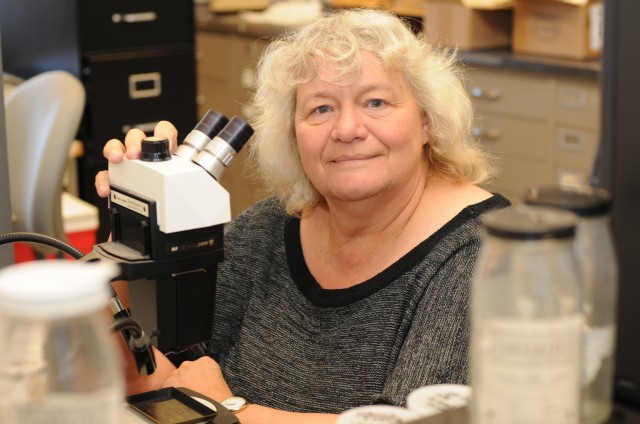Thomas Honored with Prestigious AGU Award for Paleoceanography Research

Ellen Thomas, research professor of earth and environmental sciences, has been awarded the Maurice Ewing Medal by the American Geophysical Union (AGU). The medal is one of the AGU’s most prestigious awards and will be presented to Thomas during the organization’s annual meeting later this year.
According to AGU, “Jointly sponsored with the United States Navy, the Ewing Medal is named in honor of Maurice Ewing, who made significant contributions to deep-sea exploration.” It is presented each year for significant original contributions to the scientific understanding of the processes in the ocean; for the advancement of oceanographic engineering, technology, and instrumentation; and for outstanding service to the marine sciences.
Among Thomas’ research areas is paleoceanography. She studies microscopic fossils in ocean beds and sediments that can provide clues to life and climate as it appeared on earth tens and often hundreds of millions of years ago. She is the recipient of several National Science Foundation and Keck grants. Her research has been published in Science, Geology, Oceanography, and the International Journal of Earth Sciences, among others.
“I study microscopic fossils of organisms living on the deep-sea floor to recognize the importance of the event now called the ‘Paleocene-Eocene Thermal Maximum’ as a geological counterpart of human-induced global warming through CO2 emissions, and the recognition that there have been multiple events of that type in the geological past,” she says. “These events are now used widely to study the long-term, ecosystem wide effects of rapid emission of carbon-compounds into the atmosphere. I also used these organisms, in combination with stable isotope and trace element analysis of their shells, to gain insight on the effects of other episodes of global change on oceanic life forms, including the asteroid impact which killed the dinosaurs, and to study the effect of human actions on our environment.”
Department chairwoman Martha Gilmore, associate professor and chair of earth and environmental sciences, says Thomas earned the award through her ground-breaking research.
“The Department of Earth and Environmental Sciences is thrilled that Ellen has been recognized with this award,” Gilmore says. “The American Geophysical Union is our largest professional organization and this is one of highest honors one can receive in our profession. The Ewing Medal is a testament to the quality, creativity and importance of Ellen’s work. She has pioneered and perfected techniques for reconstructing ancient ocean environments and significantly advanced our fundamental understanding the effects of climate change on the world’ s oceans. It’s a well-deserved honor and we are elated.”
Thomas also is excited.
“I feel truly amazed to have been honored by my colleagues with this award, especially so because the list of past recipients includes the names of scientists I not only greatly admire, but who also have been of major importance in influencing my scientific ideas as well as my career development.”
Thomas will receive the award at the AGU meeting in San Francisco, Calif. in December.

